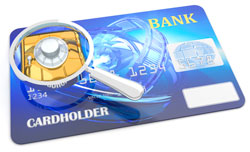The recent massive credit card breach at Target is a reminder that it is important to protect oneself against identify theft and credit card fraud. There are steps to take to try to prevent your credit card information from being taken.

Guard your information online.
*Clear you logins and passwords. This is especially important if you were using a public computer. Change logins and passwords monthly.
*Use your credit card to pay for online purchases. Debit cards do not have as many guarantees and protection under federal law as credit cards.
*Be alert for phishing, a tricky method in which spam email messages or pop-ups appear to be from legitimate banks or businesses asking for your personal information. Make certain that you verify you are on a familiar web site with security enabled before entering personal data.
Monitor your bank and credit card statements.
Regularly review your accounts so that you can promptly know when something is not right. Purchases you did not make should be obvious, such as a supermarket transaction in a city that is far away.
Verify your mailing address with the post office and financial institutions.
Identity thieves sometimes fill out change of address forms so that delinquent credit notifications are not received by you.
Monitor your credit report.
By law, you are entitled to a free credit report every year from each of the three major bureaus (Equifax, Experian, and TransUnion). Request one every four months, changing bureaus each time. You can order the report directly through each agency, or at annualcreditreport.com. Use this URL—there are hordes of knockoff sites that will try to charge you for your report and other needless services. Scan it for abnormal activity, such as accounts or credit cards you didn’t open. (And don’t fall prey to faux free credit report advertisements.)
Shred sensitive documents.
Buy a shredder and regularly shred any documents that have personal information such as bank statements and bills. Even junk mail should be shredded as it may include personal details.
Credit Card Loss Protection
Most “loss protection” services are a scam or simply charging exorbitant fees. Some are simply a front to get you to give away personal information. According to the Federal Trade Commission , your liability for unauthorized credit card charges is limited to $50 per card. Don’t be fooled by telephone solicitors scaring you into the need to protect yourself from losing thousands of dollars in unauthorized credit card charges.
Identify Theft Protection programs are available. Call Terpening Insurance at 1-800-585-1776 for more details.
